10 Sep 2014
The Allure Of Rehab Romances
People enter rehab for many reasons: some by way of external forces such as family, friends, legal obligations or employment requirements, while others are personally committed to turning their lives around. Once people walk through the doors, they are in a contained environment that may feel dramatically different than life at home.
Looking around the group therapy room or dining hall, the newly sober person may lock eyes with someone and feel a familiar flutter in the heart and butterflies in the stomach. Serotonin and dopamine that are activated in the brain when a person is using an addictive substance are not all that dissimilar from the chemicals released in human attraction. Add to it the brain chemical oxytocin, known as the “cuddle hormone” and the “tend and befriend hormone,” and there is a set-up for what is colloquially called a “rehab romance.”
Is It Really Love?
The dynamics of rehab romances are infatuation masquerading as love. Of course, there is loneliness and fear that wants to be comforted into submission. In such a setting, there is the common thread of loss, trauma, abuse and addiction that binds people together.
Comments such as “S/he gets me like no one else,” “We can stay sober together,” and “I need a place to stay when I leave here and s/he offered hers,” are commonly heard and used as justification for establishing a relationship that almost universally becomes a recipe for disaster. Why is that so?
The Perils Of Romantic Relationships During Drug Rehab
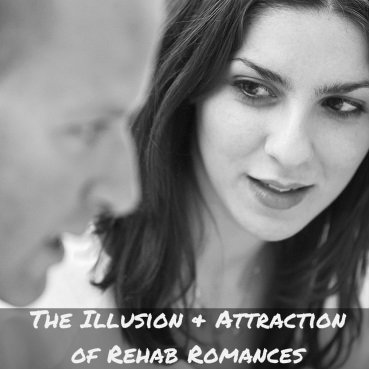 Consider that someone in the throes of addiction has a relationship with their substance(s) of choice that superseded all others in their lives while they were using. They put it ahead of their partner, children, career and health. Saying goodbye to it is not a one-and-done event. It is an evolving process. Think of getting involved with someone in an addiction treatment program as a rebound relationship. Are you willing to be the rebound guy or girl and risk playing second fiddle to the addiction should they relapse?
Consider that someone in the throes of addiction has a relationship with their substance(s) of choice that superseded all others in their lives while they were using. They put it ahead of their partner, children, career and health. Saying goodbye to it is not a one-and-done event. It is an evolving process. Think of getting involved with someone in an addiction treatment program as a rebound relationship. Are you willing to be the rebound guy or girl and risk playing second fiddle to the addiction should they relapse?
Many in recovery are also dealing with codependence and have a need to be in a caregiving role. Meeting another struggling soul is the ideal opportunity for those patterns to surface. There are likely as many who are willing to be on the other side of the equation, and surrender to being enabled.
For some, dishonesty went hand in hand with the other addictive behaviors and if someone is in a monogamous relationship outside of rehab, there may be a temptation to lie about interactions behind those doors.
Safer sex practices may not have been a consideration out in the community and may be only an afterthought in an inpatient drug rehab setting. Predatory behavior may also have been part of the addiction cycle for some in treatment and might evidence itself behind the doors of the program they are in.
Short-term gratification is part of an addict’s pattern and seeing another person who seems available in the moment is like being a proverbial “kid in a candy store.” There is often no time to think about the long-term consequences of indulging in the sweets on the shelf.
Peers in treatment may show one face in the program and another once they are discharged. The best advice is: “Don’t take anybody in. Don’t take anybody on. You don’t know what someone is like in their daily lives.”
Worth The Wait
In 12-Step recovery, the newly sober are encouraged to refrain from engaging in budding romantic relationships for at least a year, primarily because they need to focus on their recovery and create a healthy bond with themselves without the distraction of another person. Ask yourself this: “Would you want to be in a relationship with you now? Are you stable enough to sustain positive interactions with someone else?”
Take the time to really get to know, love and respect the woman or man in the mirror before reaching out to bring in a partner, particularly one who, like you, is a newborn, vulnerable infant entering into the world of recovery. Relationships are not 50/50. They are 100/100 with each person bringing 100% of who they are to the table. Wouldn’t you rather be truly prepared to bring the best of who you are to a relationship and welcome in a partner who can do the same? You are likely to find that it is worth the wait.
You’re married to the life of the party. You probably have a lot of fun with him. He loves going out with friends and entertains everyone with funny stories and goofy antics. Everyone loves him, right? But you see him the next day, worn out, hung over, unable to remember all the details of the previous night. Your husband or partner is paying a high price for his social status. Being the fun one is great, but if it is forced through the veil of drunkenness, he may have a serious problem with alcohol.
What Is An Alcoholic?
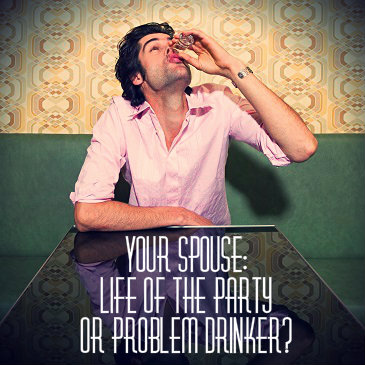 The idea of your spouse as an alcoholic is scary. The odds are he isn’t one, but it is worth educating yourself about alcoholism if you suspect he drinks too much. Alcoholism, or alcohol dependence, is a true addiction and a serious disease. It takes a lot of drinking over a long period of time to become an alcoholic. If your husband binges and regrets it on weekends, he may not be an alcoholic — yet.
The idea of your spouse as an alcoholic is scary. The odds are he isn’t one, but it is worth educating yourself about alcoholism if you suspect he drinks too much. Alcoholism, or alcohol dependence, is a true addiction and a serious disease. It takes a lot of drinking over a long period of time to become an alcoholic. If your husband binges and regrets it on weekends, he may not be an alcoholic — yet.
One of the most characteristic attributes of alcohol addiction is the presence of withdrawal symptoms. These are real, physical symptoms that result when an alcoholic stops drinking. They include tremors, anxiety, nausea, sweating, insomnia, headaches, depression and fatigue. Alcoholics severely crave alcohol to make these symptoms go away.
What Is A Problem Drinker?
While your husband may not be an alcoholic, it does not mean that he doesn’t have a problem at all. He could be a problem drinker or an almost alcoholic. Problem drinking can often look very much like being the life of the party. A problem drinker may also be that tired working mom who needs a couple glasses of wine to relax at the end of the day, but then can’t sleep well or loses her cool with the kids. A problem drinker may be someone who has symptoms of depression and drinks to feel better instead of getting help.
Any type of drinking that causes problems is problem drinking. Your husband has fun at parties and may never drive home afterward, but the next day is shot because of his hangover. He regrets the fact that he started a stupid argument with you while he was drunk. You ask him to slow down his drinking at parties and he won’t do it. Your relationship gets to be tense as a result. These are all problems caused by his behavior.
Should I Ask My Spouse To Stop Drinking?
If you have determined that your husband is indeed a problem drinker, it’s time to sit him down for a talk. Understand that he will probably be defensive so approach the topic carefully. Do not bring up the idea of alcoholism and even avoid the term problem drinker if you think that will help. Lead with how his drinking makes you feel and how you fear it will damage your relationship in the future. Discuss how much better he will feel in the morning without a hangover.
His counter arguments are likely to be that he only drinks on the weekends to de-stress or that he drinks only socially and that it isn’t a big deal. Remind him of how he feels the next day, of the regrets he usually expresses and emphasize that his drunkenness impacts you. Tell him that you hope he will slow down, but not that you need him to quit drinking altogether. Suggest that you skip one party and do something together instead to strengthen your relationship. By being honest with him you can begin to address and correct the problems that his drinking is causing.
If his drinking gets worse, it may need to come down to a professional intervention. Call us now for intervention help. You and your partner’s relationship and physical/mental health are worth it!
Your child is struggling with addiction. You have always been his caregiver. As a parent, you have taken care of him, helped him when he was down, kept him safe and took action when needed. Now that he is facing this very personal battle, you may feel helpless. How can you possibly take care of his needs when he is being ravaged by this disease? As a parent, the feeling of helplessness that accompanies the addiction of a child can be overwhelming and leave you with a sense of despair. You can’t fix the problem, but you can be there for your child and lend your support.
Why Can’t I Fix His Addiction?
You cannot fix your child’s addiction or cure him of it because addiction is a chronic disease with no hard and fast cure. You would never blame yourself for not being able to cure your child’s asthma or diabetes because you are not a doctor. You are not an addiction expert, a therapist or a doctor and you cannot treat or cure his disease. The sooner you are able to accept this fact, the better you will feel. That sense of helplessness will begin to lessen when you accept that your child has a disease that will require treatment by experts.
Can I Help My Child Overcome Addiction?
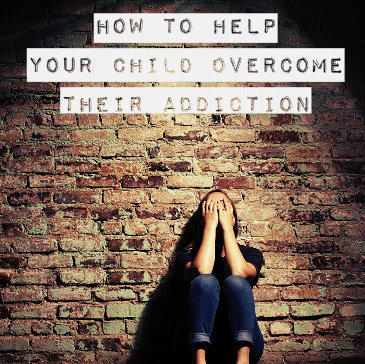 You do have the ability to help your addicted child. Once you accept that you cannot fix the problem, you can take steps to help him. Doing so will help to relieve those helpless feelings threatening to overwhelm you. In fact, taking action of some kind will keep you from falling into hopeless despair, which often leads to lethargy and inaction. Your child does need you now, so take steps to do what you can to help:
You do have the ability to help your addicted child. Once you accept that you cannot fix the problem, you can take steps to help him. Doing so will help to relieve those helpless feelings threatening to overwhelm you. In fact, taking action of some kind will keep you from falling into hopeless despair, which often leads to lethargy and inaction. Your child does need you now, so take steps to do what you can to help:
- Educate yourself – You have been blindsided by this problem and you probably have little experience with addiction. To better understand what your child is going through and what he needs from you, educate yourself about the disease of addiction. It will help you to have patience with him and to learn how to better support and assist him.
- Investigate treatment options – Unless your child is still a minor, you cannot force him to get professional help. You can, however, present him with options for treatment. Talk to your doctor about resources for addiction care and collect information about your options. Visit therapists and rehab facilities to get an idea of what is available and so that you can give your child the best choices when he is ready for help.
- Consider family therapy – Addiction is a disease that affects the entire family. Once your child has decided to get help, you can be an active participant. Engage in group therapy sessions with your child and other members of the family. He will find motivation in seeing that you and his loved ones are committed to his treatment.
- Build support – Your child is going through a difficult struggle, but so are you. You cannot give all your attention to him and forget about your own needs. Make sure you have built up support for yourself. Consider joining a support group for the loved ones of addicts. Also make sure that you have friends or family with whom you can talk when you feel overwhelmed and stressed. Support is necessary for addicts, but it is important for you too.
It is only natural to feel helpless when you cannot fix your child’s problem. You can guide him through it, though, and you can support him. When he is ready for help, be there for him and you will be doing the best you can.
If You Or Someone You Love Is Struggling With Drug Or Alcohol Abuse, You’ve Come To The Right Place – Help Is Just A Phone Call Away!
12 Aug 2014
Curb Your Shopping Addiction
Traditionally, the term addiction has been restricted to the description of dependence on a chemical substance, such as drugs or alcohol. Today we have a broader view of what addiction is and many experts recognize what they call behavioral, or process, addictions. Certain behaviors, like gambling, eating, or shopping, can become habitual in a similar way to drug abuse. If you feel you may be starting to cross a line when it comes to your shopping and spending, recognize your behaviors and learn how to curb them before you really get out of control.
Shopping As An Addiction
 There is nothing wrong with enjoying shopping. Even shopping as a regular hobby is not necessarily a bad thing. As with any behavior, though, you may cross the line into addictive territory. Some of the aspects of chemical addictions are similar to what people with a shopping addiction experience. For instance, engaging in a shopping spree may be associated with strong emotions. People who shop compulsively often continue to do so in the face of financial problems. They may let their habit interfere with relationships. These are all commonalities with drug and alcohol addiction.
There is nothing wrong with enjoying shopping. Even shopping as a regular hobby is not necessarily a bad thing. As with any behavior, though, you may cross the line into addictive territory. Some of the aspects of chemical addictions are similar to what people with a shopping addiction experience. For instance, engaging in a shopping spree may be associated with strong emotions. People who shop compulsively often continue to do so in the face of financial problems. They may let their habit interfere with relationships. These are all commonalities with drug and alcohol addiction.
How Do You Recognize A Shopping Addiction?
You have had a bad day at work. You got in a fight with your boyfriend or your husband. The kids are really getting on nerves. What do you do to relieve your stress and boost your mood? If your automatic answer is to go shopping or make a purchase, you might have a problem. Using a behavior, like shopping, to regularly boost your mood and regulate your emotions is a sign of an addictive habit.
Other signs that your shopping is becoming a real problem include buying in spite of financial woes. Compulsive shoppers keep going even when they have drained the bank account. They rack up huge credit card debt. Some even lose their homes because of their habits. Maybe you’re hooked on bargains. Do you buy a new pair of black heels that are half off, even though you have ten pairs in your closet? If so, you could have a problem. Is your shopping disrupting your relationships? Are you hiding your purchases from your partner because you know they will start a fight otherwise? These are all signs that you have a very bad habit.
How Can You Curb Your Shopping Addiction?
The good news is that you can take steps now to reverse your compulsive shopping. Unless you are in so deep that you really can’t stop, these actions will help.:
- To limit how much you spend, only use cash
- Cut up all your credit cards to avoid the temptation to build more debt
- Make a list before you go shopping and stick to it strictly
- Eliminate all impulse buys
- Stay offline if you are a compulsive Internet shopper
What is most important and oftentimes most difficult is figuring out why you shop. When you feel the urge, stop to think about what is driving you to go shopping. Are you stressed? Depressed or anxious? Is there a particular event that is making you feel bad? Face these things head on rather than drowning your emotions in a shopping binge. When you face what you’re feeling you can find better ways to cope. Instead of going shopping, go for a jog. Have a cup of tea and read a book. Take a hot bath or talk to a friend. Whatever you do, don’t give in to the urge to shop. If you still can’t control your urges, seek professional help.
Read On To Find Out If You Have A Food Addiction Or Other Behavioral Addiction
06 Aug 2014
Tips To Cope With Relapse As A Woman
Addiction is a problem that affects both men and women. It doesn’t discriminate. But how we cope with addiction, how we heal from it and how we relapse does depend on our gender. As a woman your motivations for using drugs or alcohol again, after a period of sobriety, are likely different from a man’s. The best way to cope and get back on your feet will also differ for you as a woman. If you do relapse, realize that there are effective ways to help you cope and get sober again.
Women And Relapse
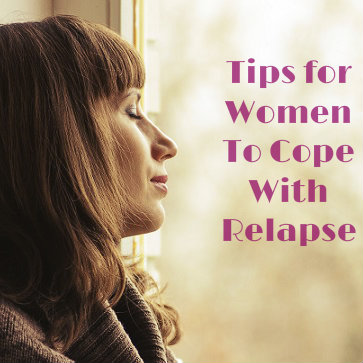 Researchers have found that there are differences between the genders with respect to addiction, treatment and relapse. One study looked at thousands of alcoholics, both men and women, receiving treatment. Each participant attended an assigned style of treatment, but all were allowed to go to support group meetings in addition to their official programs. All then reported on how they fared in terms of sobriety, relapse and support.
Researchers have found that there are differences between the genders with respect to addiction, treatment and relapse. One study looked at thousands of alcoholics, both men and women, receiving treatment. Each participant attended an assigned style of treatment, but all were allowed to go to support group meetings in addition to their official programs. All then reported on how they fared in terms of sobriety, relapse and support.
The researchers found that men who took advantage of support groups, such as Alcoholics Anonymous, did so to make non-drinking friends and to build up a support network to help them avoid the temptations of being around alcohol. For men, being in social situations with alcohol was the biggest trigger to relapse. The study found that this wasn’t the case for women. For us, the biggest trigger is emotional. Women used support groups to cope with their emotions, like depression or anxiety, which tempted them to relapse and start drinking again.
Women And Emotions
Knowing that as a woman your primary triggers for relapse are your feelings and state of mind, you have a powerful piece of information. Knowing your triggers is the key to avoiding them and avoid having a relapse. With emotions backing your relapse triggers, it is more important than ever to pay attention to and care for your emotional life. Here’s what you can do:
Tips To Cope With Relapse And Emotions
- Stay in counseling – Therapy or counseling sessions help you recognize, regulate, and control your emotions. Many people who have gone through rehab simply stop attending sessions thinking they no longer need the help. You may not need your therapist as often as you once did, but you still need some check-ups. Keep a regular, even if infrequent, schedule of counseling sessions for emotional maintenance.
- Practice relaxation techniques – When your emotions start to build and you feel angry, lonely or depressed, you may want to turn back to your habit. Instead, turn to meditation, yoga, and other practices that help you relax and re-focus. These can be very powerful ways to control your urges to relapse.
- Take care of your body – Too often we are too busy to take good care of ourselves, but our emotional states are connected to our physical states. Eat well, get plenty of sleep every night, and get regular exercise and you will feel better every day.
- Get involved – Being intellectually and socially engaged with the world around you can help you to better cope with your emotions. Having a support network is important in helping you resist relapse urges, but so is engaging your mind. Try new activities and develop new hobbies and skills.
As a woman you face unique problems associated with your addiction and your potential to relapse. Unlike men, we are driven to abuse substances by our emotions. We cope with our feelings by using drugs or by drinking. When you can learn to recognize your destructive emotions and cope with them, you can avoid relapsing and stay sober.
Read Our Other Informative Addiction Blogs To Help Women!
01 Aug 2014
How To Avoid Getting Hooked On Sleeping Pills
When most of us think about addiction, we envision someone shooting up heroin, smoking meth or drinking nonstop. Did you know that you can develop a dependence on drugs that seem much more harmless? We tend to think of prescriptions as safe because they are prescribed by doctors, but you should always be aware of the risks of any drugs you take. Sleeping pills are used commonly in the U.S. and it is possible to become addicted to them. If you need sleep aids, find out what the dangers are and learn how not to become dependent on them.
Can A Pill Cure My Sleeping Problems?
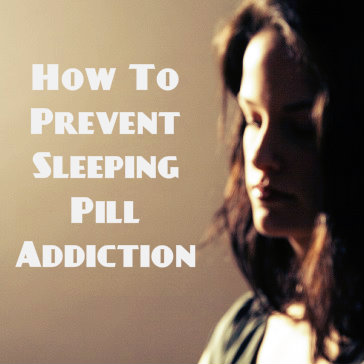 Too many people rely on sleep aids to get a good night’s rest without dealing with their underlying problems. Being unable to sleep is usually a symptom of another problem. You may struggle to sleep because you have another medical condition, but it’s more likely that your insomnia is related to stress. While a sleep aid may help you get some rest, it is not the answer to your problems. Sleeping pills are designed for short-term use, not for lifelong treatment.
Too many people rely on sleep aids to get a good night’s rest without dealing with their underlying problems. Being unable to sleep is usually a symptom of another problem. You may struggle to sleep because you have another medical condition, but it’s more likely that your insomnia is related to stress. While a sleep aid may help you get some rest, it is not the answer to your problems. Sleeping pills are designed for short-term use, not for lifelong treatment.
Are Sleeping Pills Addictive?
If you do use your sleep aid for a long period of time or if you deviate from your doctor’s instructions, you run the risk of experiencing side effects, of not solving the underlying problem causing insomnia and of developing a dependence on the medication. The risk level depends on the medication. Sleep aids include those that help you fall asleep and those that help you stay asleep through the night.
In the first category is Lunesta, which can cause withdrawal symptoms, and Halcion and Sonata, both of which are habit-forming. Among the drugs that can help you stay asleep all night are Estazolam and Restoril, both of which are also habit-forming. There are other sleeping pills that can be prescribed, which are not habit-forming and which do not cause withdrawal when you stop using them. Each one comes with its own list of side effects and some may not work well for you. Which one you take is a decision you and your doctor should make.
Some prescription sleeping pills are habit-forming, which means they are susceptible to abuse and can lead to addiction. Even with those medications that are not considered addictive, there is a risk of developing dependence. When you rely on a pill to get to sleep at night you may become psychologically dependent on it. The idea of not having that crutch to help you sleep can cause anxiety and lead you to keep using the medication, even when you no longer need it.
How Can I Take Sleeping Pills Safely?
The most important consideration in taking prescription sleep aids is to follow your doctor’s instructions. Speak up and discuss with your doctor if you feel like you are becoming dependent on your sleeping pill. Even over-the-counter sleep aids can lead to dependence if you are relying on them every night. If you need to take one for several nights in a row, talk to your doctor so that you can address the underlying reasons for your insomnia.
A sleep aid can be a good way to catch up on rest, but it is not a solution to your problem. Make sure that you get treatment for your insomnia. This may mean going through counseling to address any psychological issues keeping you awake, or trying natural methods or alternative medicine. Always take care when using prescriptions of any kind and keep yourself informed as to the risks and the possibility of dependency.
18 Jul 2014
How To Stop Drinking When You Become Pregnant
Every mother-to-be wants the best for her future child, but when you struggle with drinking that means making a big sacrifice. If you drink a lot and have wondered if you have a drinking problem, and suddenly find out you’re pregnant, it’s like a big and important wake-up call. Now is your chance to get sober and do what is best for you and your baby.
Have I Already Hurt My Baby With Drinking?
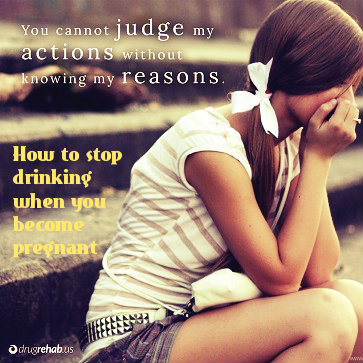 Many women who get pregnant without having planned for it worry that they have already caused harm by drinking during their early stages of pregnancy. While it is best to not be drinking at all, the most important thing is to stop drinking as soon as you find out. Not all experts agree on just how much alcohol can cause harm to a fetus, but the first few weeks are a time of rapid development. That being said, many women do go on to give birth to perfectly healthy babies.
Many women who get pregnant without having planned for it worry that they have already caused harm by drinking during their early stages of pregnancy. While it is best to not be drinking at all, the most important thing is to stop drinking as soon as you find out. Not all experts agree on just how much alcohol can cause harm to a fetus, but the first few weeks are a time of rapid development. That being said, many women do go on to give birth to perfectly healthy babies.
The real issue is what can happen if you continue to drink throughout your pregnancy. Any amount of alcohol can impact your child and cause fetal alcohol spectrum disorders. These are preventable illnesses that produce a variety of symptoms in a child whose mother drank during pregnancy. Possible symptoms include unusual facial features, low body weight and small size, poor coordination, hyperactivity, learning disabilities, delays in developing speech and language skills, sleep difficulties, vision and hearing problems, and even organ damage.
How Do I Stop Drinking?
There is no point in feeling guilty about having already consumed alcohol while pregnant. Now is the time to cut yourself off completely, no matter how difficult that may be. Of course if you feel you can’t do it, no matter the risk to your child, turn to addiction professionals to help you get sober and monitor both your health and that of your baby.
If, on the other hand, your problem is not that severe, there are some steps you can take to make giving up alcohol a little easier. First, associate and socialize more with people who don’t drink or in situations where there will be no alcohol. Going to parties where everyone is drinking will make quitting much more difficult.
Learn how to make fantastic virgin drinks. Cocktails are huge right now and there is no reason you can’t join in on the trend. There are plenty of resources available to help you find recipes for delicious mocktails. Or, get creative and come up with your own recipes.
If drinking has been a habit that helps you relax and unwind at the end of the day, replace it with a healthier way to de-stress. Exercise is a wonderful way to relax, and also for you and your baby to stay healthy. Just be sure that you keep your doctor in the loop in case certain types of exercise should be avoided. You can also relax by engaging in a hobby, reading a good book, taking a nice long bath or by meditating.
Giving up alcohol for the health and safety of your baby may be the most important thing you ever do. It won’t be easy if you have made a habit of drinking too much or regularly, but it is doable. Just remember that if you really struggle to get on the wagon, professionals are available to help you.
Learn More – Why Do Women Continue To Drink During Pregnancy?
If You Need Help With An Addiction, Call Us Now – We Are Available For You 24/7
07 Jul 2014
Are Binge Drinkers Addicted To Alcohol?
Binge drinking is a term used to describe heavy drinking. According to the National Institute on Alcohol Abuse and Alcoholism (NIAAA), binge drinking means having enough drinks in a two hour period to achieve a blood alcohol concentration level of 0.08, a level at which a person is considered to be intoxicated. Binge drinking is increasingly common, but does it make a person an alcoholic or addicted to alcohol? The answer is not so simple.
The Risks Of Binge Drinking
For women, binge drinking typically means having four or more drinks in a two-hour period. For men, it means having five or more drinks. Consuming this much alcohol in one sitting, or more, is detrimental to your health. And if you drink this way, you are not alone. One in every six adults in the U.S. binges four times a month. Each binge includes eight drinks on average. This is a lot of alcohol.
Binge drinking can lead to a number of health problems, not least of which is dependence on alcohol, or alcoholism. It can also cause:
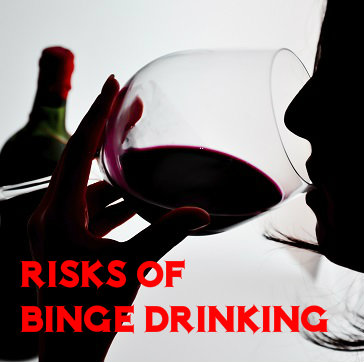 liver disease
liver disease- high blood pressure
- heart attack
- stroke
- neurological damage
- complications if you have diabetes
Binge drinking also leads to:
- accidents and injuries
- alcohol poisoning
- fetal alcohol syndrome
- unintended pregnancies
- problems with relationships
- strain on career and finances
What Is Alcoholism?
So does binge drinking make you an alcoholic? Not necessarily. Addictive disorders are most often diagnosed based on the Diagnostic and Statistical Manual of Mental Disorders. The fifth version of this manual recently came out with new criteria for alcohol addiction. The fourth edition listed alcohol abuse and alcohol dependence (alcoholism) as two separate disorders. The fifth edition merged the two into one disorder: alcohol use disorder. A person can be diagnosed as having a mild, moderate or severe case of alcohol use disorder.
According to the fifth edition, to have an alcohol use disorder you must have two of the eleven symptoms listed in the manual. Having two or three symptoms represents a mild case. Binge drinking is not listed as a symptom, but several of the symptoms could result from binge drinking. For instance, one symptom is drinking more than you intended to on a particular occasion. Many binge drinkers could claim doing this. Another symptom is trying to drink less, but failing. Again, this can happen with binge drinking.
There are several other symptoms that could go hand-in-hand with binge drinking. This means that if you binge drink and end up having two of these symptoms, you could be diagnosed as having mild alcohol use disorder. If the risks of binge drinking are not enough to make you want to slow down, maybe this fact is.
Stopping Binge Drinking
Moderate drinking is not harmful to your health, unless you have specific conditions that are exacerbated by alcohol. If you binge drink regularly, consider cutting back to moderate drinking levels. If you don’t, you put yourself at risk for a number of health problems. Not least of these is alcohol use disorder. If you could qualify for a diagnosis of mild now, you are on the path to having moderate or severe alcohol use disorder later.
Being a moderate drinker means having no more than three drinks per day and seven per week if you are a woman. If you are a man, have no more than four drinks per day and 14 in a week. Cutting back is important for your health, but if you find you can’t, you may need to get help. Rely on friends and family to support you in drinking less, or find a support group to join. You don’t need to be a full-blown alcoholic to ask for help. Doing so now could save you disastrous consequences in the future.
If You Or Someone You Love Needs Help Quitting Drinking – Call Us Now – We Will Get You On The Path To Happy And Healthy Sobriety!


